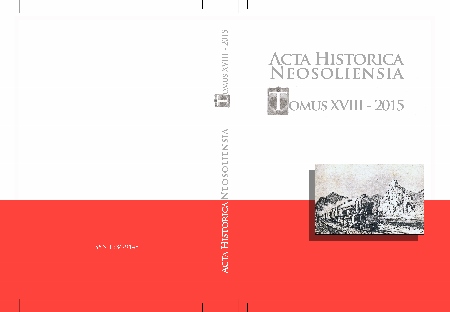Konfesia ako motivácia migrácie
Confession as a motivation of migration
(inside) Hungarian migration of Protestants between coercion and invitation
Author(s): Eva KowalskáSubject(s): Cultural history, 16th Century, 17th Century, Migration Studies
Published by: Filozofická fakulta Univerzity Mateja Bela
Summary/Abstract: Confessional motivation of migration in the Early Modern times Kingdom of Hungary is in no way an unusual phenomenon that would deviate from the wide range of causes and connections of changes of demographic and population development. Apart from acute military danger, the possibilities of religion performing have limited its continuance or movement into new settlement in all documented cases since the very beginning of bigger movement of population within Europe. The confessional factor was not the only motive that could stimulate movement of population in space (mainly moving because of better suste-nance was important), however, speaking about interpretation of migration waves, it is impossible to avoid considering the meaning of conditions for religion performing. It is interesting that in the case of the Kingdom of Hungary of the 16th – 18th centuries, the migra-tion was oriented in spheres that have exhibited radically different religious tradition or structure: concurrently, a confrontation with foreign – non-Christian religion (Islam) could happen, it could also be a process of colonization of desolate areas and building of religious infrastructure on „green meadow“ or integration of coming group into the environment with more church societies that work together or vice versa – they are competitive. As an immedi-ate impulse could work phenomena such as forced leaving from home, banishing or more precisely expulsion, escape from religious persecution or voluntary movement into areas where the impact of any restriction actions, whether from the side of nobility or own denom-ination, was not expected. If the confessional motive was significant factor in deciding on the side of persons interested in migration, maintaining conditions for promised way of religion performance stayed in hands of landlords who organised colonization of areas. Before the stabilization of local government promised conditions were kept without any problems. However, after 1731 Recatholisation trend has spread. It corresponded to the principle of restriction of non-Catholic religions performances and observance of generally laws in force and orders in those areas (regions) that were initially (by the laws passed in 1681 at a diet in Sopron) out of their reach. This trend was also commensurate with the way how organisa-tional structures of state power and noble self–government were consolidated in freed areas: their crowding and intensification has brought the restriction of original privileges, unifica-tion of government, management and control.
Journal: Acta historica Neosoliensia
- Issue Year: 18/2015
- Issue No: 1
- Page Range: 64-82
- Page Count: 19
- Language: Slovak

